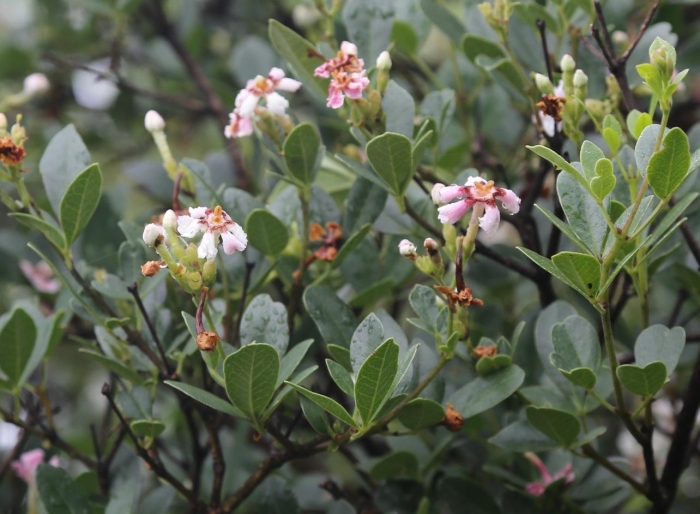Winged Petiole Schrebera
(Schrebera alata)
Winged Petiole Schrebera (Schrebera alata)
/
/

Wynand Uys
CC BY 4.0
Image By:
Wynand Uys
Recorded By:
Copyright:
CC BY 4.0
Copyright Notice:
Photo by: Wynand Uys | License Type: CC BY 4.0 | License URL: http://creativecommons.org/licenses/by/4.0/ | Rights Holder: Wynand Uys | Publisher: iNaturalist | Date Created: 42014 |























Estimated Native Range
Summary
Schrebera alata, commonly known as Winged Petiole Schrebera, is a deciduous tree native to a variety of habitats including montane forests, miombo woodlands, and wooded grasslands in parts of Eastern and Southern Africa. It is found in countries such as Ethiopia, the Democratic Republic of the Congo, Uganda, Rwanda, Burundi, Kenya, Tanzania, Angola, Zambia, Zimbabwe, Malawi, Mozambique, Eswatini, and South Africa, typically at altitudes of 3281-5906 feet (1000-1800 meters). Schrebera alata can grow up to 49 feet (15 meters) tall and is recognized by its winged petioles, which are the slender stalks that attach the leaf blade to the stem.
The tree is not widely known in cultivation but offers potential for use in large gardens and parks, particularly in regions with a similar climate to its native range. It requires well-drained soils and can tolerate a range of soil types, from clay to loamy textures. Schrebera alata prefers full sun to partial shade and moderate water availability. While not commonly grown, its ornamental value lies in its form and the unique feature of its winged petioles. There is limited information on common cultivars, diseases, or other potential problems, but as with many trees, monitoring for common pests and diseases is advisable. This species could be of interest for further horticultural development due to its adaptability and attractive appearance.CC BY-SA 4.0
The tree is not widely known in cultivation but offers potential for use in large gardens and parks, particularly in regions with a similar climate to its native range. It requires well-drained soils and can tolerate a range of soil types, from clay to loamy textures. Schrebera alata prefers full sun to partial shade and moderate water availability. While not commonly grown, its ornamental value lies in its form and the unique feature of its winged petioles. There is limited information on common cultivars, diseases, or other potential problems, but as with many trees, monitoring for common pests and diseases is advisable. This species could be of interest for further horticultural development due to its adaptability and attractive appearance.CC BY-SA 4.0
Plant Description
- Plant Type: Shrub, Tree
- Height: 20-40 feet
- Width: 15-25 feet
- Growth Rate: Moderate
- Flower Color: White
- Flowering Season: Summer
- Leaf Retention: Deciduous
Growth Requirements
- Sun: Full Sun
- Water: Medium
- Drainage: Medium, Fast
Common Uses
Bird Garden, Low Maintenance
Natural Habitat
Montane forests, miombo woodlands, and wooded grasslands
Other Names
Common Names: Winged Schrebera, Forest Jasmine
Scientific Names: , Schrebera alata, Nathusia alata, Nathusia holstii, Nathusia obliquifoliolata, Schrebera alata var. tomentella, Schrebera alta, Schrebera argyrotricha, Schrebera excelsa, Schrebera excelsa var. somnifera
GBIF Accepted Name: